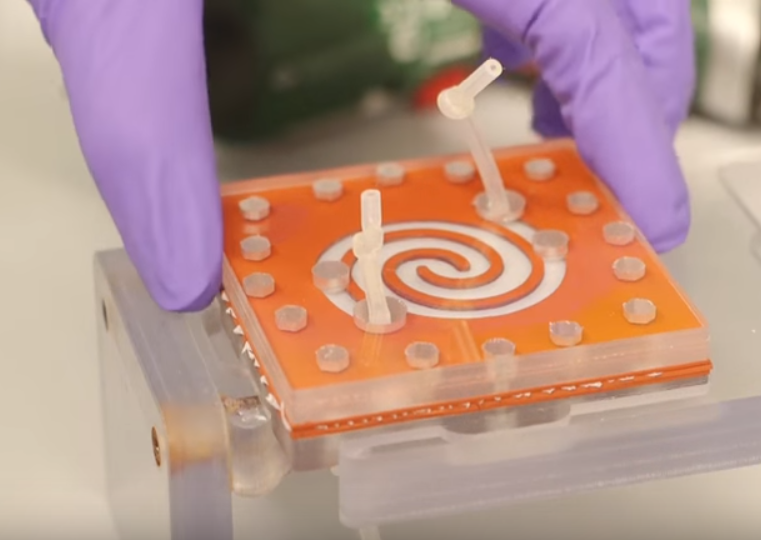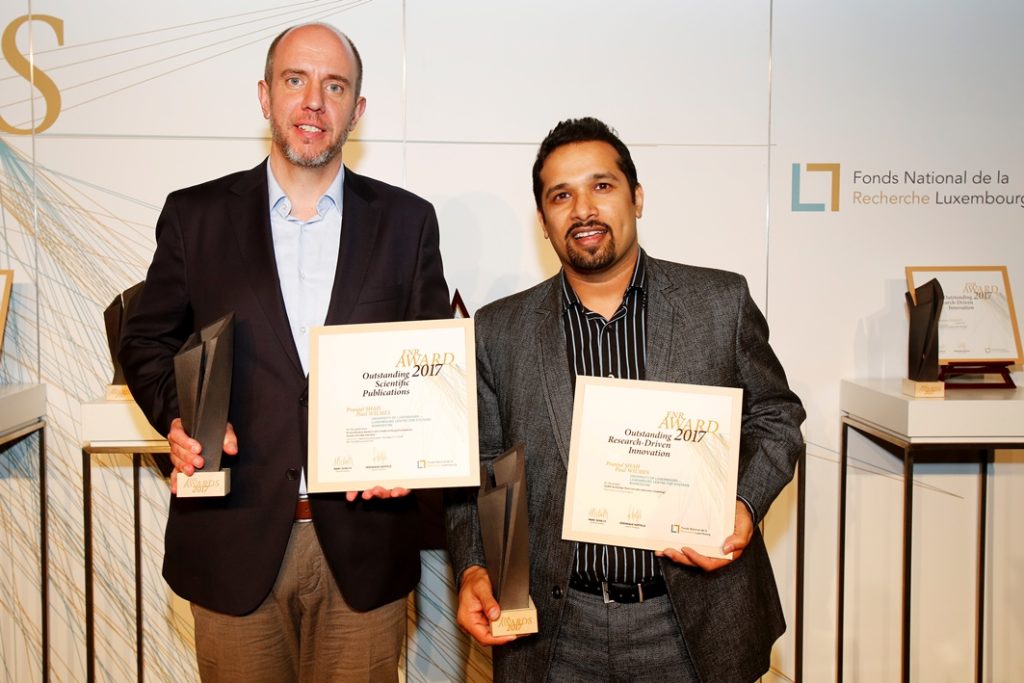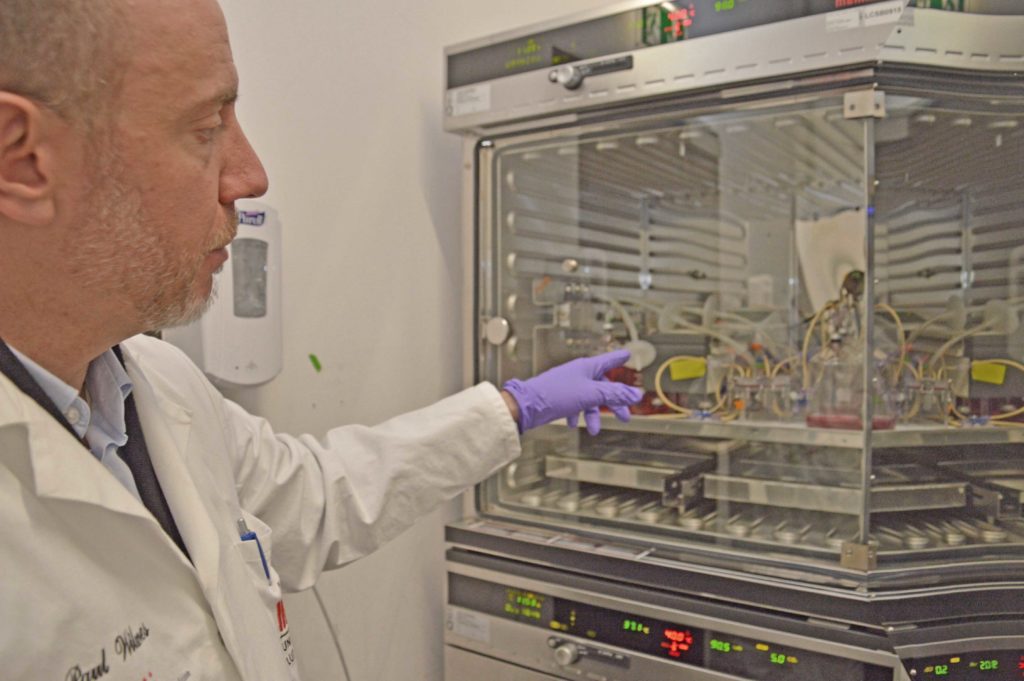BACK TO RESEARCH WITH IMPACT: FNR HIGHLIGHTS
BACK TO RESEARCH WITH IMPACT: FNR HIGHLIGHTS

Paul Wilmes’ original background is in Environmental Sciences, but with his FNR ATTRACT Fellowship and move from the United States to Luxembourg in 2010, the Luxembourg national branched out into biomedicine. We spoke to the prolific scientist about his ‘gut-on-a-chip’ model, the importance of carving out research niches, his goals and recent parental leave period.
Did you always see yourself becoming a scientist?
“Yes, I think I always had it in me. I have always asked tough questions and been inquisitive to the point of getting on my teachers’ nerves! I am fascinated by the idea of making discoveries and I like to push boundaries. I think these are essential qualities for a scientist.”
You were in the United States at the University of California, Berkeley before you came back to Luxembourg. What was the main reason for your return?
“I wanted to take the next step in my career, but in 2008/2009, when I was actively looking in the US, the number of new positions was extremely limited as a result of the financial crisis. I had kept an eye on Luxembourg, and I was aware that there was a lot on the horizon for research here. I applied for an FNR ATTRACT Fellowship in 2009 and was successful. My wife and I came to Luxembourg in early 2010.”

Which part of your work brings you the most joy?
“Obviously, the science! To explain what drives me in the day-to-day, I often refer to a quote by physicist Richard Feynman that research is all about ‘the pleasure of finding things out’. I also very much enjoy mentoring and interacting with people – bringing them together on a common vision – as well as the day-to-day supervision of my PhD students and postdocs, but also the technicians. We have talented technicians in my lab, and I do try to find ways to further their careers as well, and to keep them engaged and happy.”
So it’s important for you to support the members in your group.
“In general, I try to support group members as much as I can, so they are well placed for successful careers. A few of my former PhD students are already independent scientists in their own right. My former postdocs have also been able to pursue their careers of choice, which has meant for the majority that they have stayed in academic research being principal investigators either on the national, such as the Luxembourg Institute of Health, or international level, such as the French CNRS.”

You are originally from Luxembourg, and your parents live here and often help out with childcare.

“Yes – it’s an absolute privilege to be a scientist in a place where you are also close to your family. My wife is American so we do not see her family too much. Nevertheless, my parents and family are a huge support – I regularly work 16 to 18 hours a day, and we could not do it without the support of them. For scientists, it’s the exception rather than the norm to have a wider family support network close by. I have the biggest respect for couples where both are in academia without such a support network close by.”
You recently took parental leave – did you find time to catch up on some of the family time you sacrificed over the last years?
“Yes, I have been able to bond with our kids in new ways. Last summer I somewhat slowed down for the first time since being back in Luxembourg and I realised that there were so many things I had not been able to pay attention to, which made me realise I had to take some time to spend with our kids.
“Also, my wife has just taken up a new position at the university and I want to support her as much as I can. She has been incredibly supportive over the last years, gave up a permanent position at Berkeley before our move and it is important for me to take the burden off her in relation to the family for a few months.”
“It’s an absolute privilege to be a scientist in a place where you are also close to your family.”
Work of yours that has stood out in particular in Luxembourg, and internationally, is the ‘gut-on-a-chip’ system HuMiX, for which you also were awarded two FNR Awards last year, one for Outstanding Research-Driven Innovation and another for Outstanding Scientific Publication. Can you describe it in a nutshell?
“HuMiX is a model of the human gut that allows for the precise study of the interactions between representative human cell types and microorganisms which are part of the human microbiome[1].”

Why is it important to look at the microbiome in the first place, and how does HuMiX make this possible?
“We can now observe that there is a general association between changes to the gut microbiome and the major classes of chronic diseases such as metabolic diseases (diabetes), neurodegenerative diseases (Parkinson’s disease) and cancer (colorectal cancer). However, the key question now is: Are those differences a cause or a consequence of the disease?
“In order to study mechanisms, for example to investigate the consequences on a cellular level of molecules exchanged between bacteria and the human body, and vice versa, experiments are necessary, but mice – which are most often used – do not have the same diet, gut physiology, microbes or immune system as humans, so it is not generally possible to accurately investigate links in this way.”
“Among other applications, HuMiX is a tool for fundamental research. Paired to the other major toolbox which we have pioneered, i.e. integrated “multi-omics” of microbiomes, HuMiX allows the study of how different microbiome constellations might be functionally different, and cause or contribute to the aforementioned diseases in humans.”


Your background is actually in Environmental Sciences, how did you end up developing a model of the human gut?
“I was moving over to the Luxembourg Centre for Systems Biomedicine (LCSB) and I had to develop a significant research line in the biomedical domain. The human gut microbiome was beginning to attract intense research interest. During my PhD and postdoc, I had pioneered the development of high-throughput molecular methods for microbiome analyses. However, gathering data as part of discovery-focused endeavours is one thing.”
“The key is to figure out how one observation relates to another, for example, what differences in the gut microbiome between healthy and diseased individuals tell us about the underlying disease mechanisms. To unravel such interdependencies, experiments in representative models are necessary.”
“For obvious reasons, performing experiments in the human gut is not straightforward and animal models are sub-optimal. In developing my research strategy for working on the human gut microbiome, I rather quickly figured out that there was no representative model for conducting experiments.”
“I therefore set out to develop such a model to test hypotheses and to directly interface with our analytical capabilities. I submitted my first grant proposal to the FNR’s CORE programme in 2011, which was successful. That is how HuMiX got its first funding.”
Is HuMiX attracting attention from companies?
“Yes, the microbiome is currently a very hot area for product development. For example, in many cases, there is no real evidence that the probiotic yoghurt you buy in the supermarket actually has a beneficial impact on your gut and health. In addition, dietary components (prebiotics, e.g. fibre) and supplements are marketed without clear knowledge on efficacy.
“HuMiX is therefore of interest to companies who want to improve pre- and probiotic products, but also to those that aim to develop microbiome-based therapeutics. It has also garnered the interest of food and nutrition companies, as well as the pharmaceutical industry, who are interested in using it to improve the efficacy of their products and develop new ones.”
Would you say that the research efforts that your group and the LCSB has put into the microbiome in the years has put Luxembourg on the map in the biomedicine domain?
“Without a doubt. Together with our national and international collaborators, we have published numerous high-profile papers. However, generating the science is one thing. The other aspect is to build an international network, an effort which I have led.
“In 2015, I co-organised the International Human Microbiome Consortium (IHMC) Congress here in Luxembourg, which brought 600 scientists from across the world to Luxembourg and brought attention to the work here in the country. At the time, Luxembourg was not even a member of the Consortium, yet we convinced them to host the meeting here. I am also a co-founder of the Luxembourg Society for Microbiology, which we have recently affiliated to the Federation of European Microbiological Societies (FEMS). Apart from this, I was elected ambassador of the International Society for Microbial Ecology (ISME).
“With visibility comes engagement with the broader international scientific community. When looking at biomedical research and the microbiome, it’s impossible to cover everything. You have to carve out certain niches that you think will have impact in the future. I strongly believe that microbiome research occupies such a niche for Luxembourg as we have already proven.
“The FNR has recently funded a PRIDE “Microbiomes in One Health” doctoral training unit (MICROH-DTU) of which I am the coordinator. It builds on our methodological framework and concepts. We already have critical mass in microbiome science in Luxembourg, the question now is how to best leverage it to further generate impact. Here collaboration across the different institutions is essential. We are tiny compared to efforts in other countries but we have proven to have an edge when we work together.”

Speaking of niches, HuMiX is far from the only project you work on, you also work on wastewater treatment systems, work which is also starting to get international attention.
“One aspect that we developed on the wastewater treatment system that we work on was to develop a methodological framework to generate and integrate all of the omic[2] data sets in a proper systematic manner. This has allowed us to reconstruct the genomes of bacteria and whether specific genes are expressed under specific conditions while also tracking metabolism, all at the same time in the same sample taken from a given environment.
“We pioneered this integrated analysis approach here in Luxembourg. It has maybe not gotten as much visibility as HuMiX, but it’s what we have published most on and what we are the most known for in our field. I think that the strategy to focus on method development and to see where the field would be heading in the longer term has paid off.”
Do you have an ultimate research goal?
“Absolutely: Understanding the ecology of microbial communities so they can be precisely steered in a desired direction. In the context of the human gut microbiome, this would for example mean being able to give people food supplements or change their diet, or supplement it with probiotics, such that the ecology could be altered with the ultimate aim of reverting a disease or keeping people healthy.”
[2] Of or pertaining to related measurements or data from such interrelated fields as genomics, transcriptomics, proteomics, metabolomics or other fields. source
What are your thoughts on the FNR’s ATTRACT programme, and Luxembourg’s future in research?
“ATTRACT is really the right programme for Luxembourg. I think programmes like these will define Luxembourg science. I don’t think we have seen the full fruits of this yet – you look at the papers coming out now after the programme has been running for a few years, and they are largely in excellent journals and are being well cited. As we all know, progress in science is evolutive and takes time to generate real impact. What is important now is to build on this and take it to the next level. The best has yet to come!
“Luxembourg will have its own brand of science that will be defined by this generation of scientists. It will be unique – the science here is very interdisciplinary and I think this is a huge advantage. There are things that still have to be figured out, for example career perspectives, but the future is very bright!”
Will you stay in Luxembourg?
“I have a strong stake here in Luxembourg now – I have worked hard to build things up here and I want to see it come to fruition, because I don’t think we are quite there yet. I obviously also have strong family roots in Luxembourg and our kids are implanted here. But in science and academia one has to remain flexible. Whether we stay, we will see!”
[1] a community of microorganisms (such as bacteria, fungi, archaea and viruses) that inhabit a particular environment and especially the collection of microorganisms living in or on the human body – source
About ATTRACT
The ATTRACT programme is designed for researchers not yet established in Luxembourg, who demonstrate the potential to become leaders in their field of research. The scheme offers promising junior researchers the opportunity to set up their own research team within one of the country’s research institutions. The financial contribution by the FNR can be up to 1.5 MEUR for Starting Investigators (Postdoc & Junior Researcher level) or 2 MEUR for Consolidating Investigators (Established Researcher level). In the 2018/19 Call, the FNR expects to be able to fund 2 projects. Projects have a lifespan of 5 years. The next ATTRACT deadline is 15 November 2018 (pre-proposals). Find out more